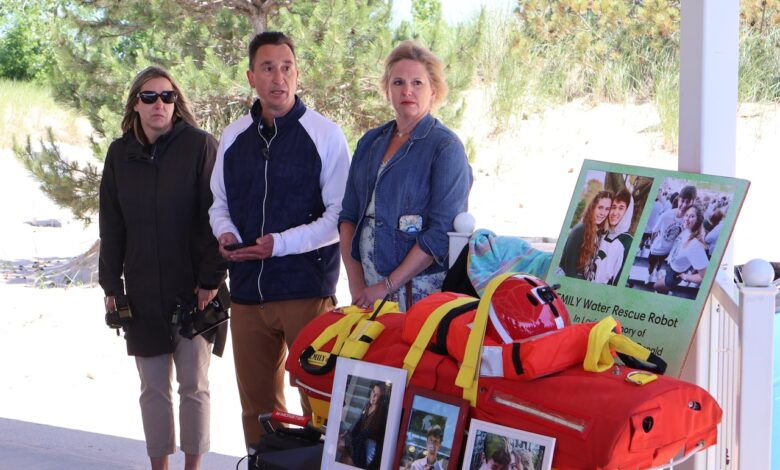Lifesaving robots arrive on Lake Michigan beaches to prevent drownings

ST. JOSEPH, MI — As people were enjoying a sunny day on the shores of Lake Michigan, rescuers were on the same stretch of beach preparing for an emergency.
They now have some new technology to help.
Instructors demonstrated the high-tech tool at a Monday, June 10, training event at Silver Beach in the city of St. Joseph. E.M.I.L.Y. is a battery-powered and remote-controlled boat, which can be used at beaches for drowning prevention and water rescue.
RELATED: Lake Michigan beach to get lifesaving, high-tech robot
Instructor and retired firefighter Bob Pratt, neck high in the rough water, waved his arms in the air Monday. Seconds later, the lifesaving robot recently donated to the beach, was launched from the shore and motored across the lake.
Controlled by an operator onshore, E.M.I.L.Y. smashed over the waves, making it to Pratt and helping him float until a lifeguard reached him.
Pratt and the lifeguard emerged from the water unharmed.
Unfortunately, the real thing happens too often, beach safety advocates say. Struggling swimmers have drowned in Lake Michigan in tragedies documented up and down the coast.
“It is our mission to protect beachgoers,” said Lisa MacDonald, the mother of a young woman who drowned in 2022, and one of the donors of the beach robots.
RELATED: Why were Lake Michigan drownings down last year? 5 possible reasons
The $12,800 E.M.I.L.Y. (Emergency Integrated Lifesaving Lanyard) is a new tool for the beaches, meant to prevent tragic drowning deaths along the big lake that draws tourists to the region from around the world.
Police, lifeguards, beach safety advocates and others, gathered for the training that began with classroom instruction in the morning and ended on the beach in the afternoon.
Lifeguards ran drills, charging into the water and back to the beach, and took turns trying the controls of the new device.
When seconds can make the difference between life and death, the E.M.I.L.Y. robot is designed to get there faster than a human lifeguard can, Great Lakes Surf Rescue Project Co-Founder and Executive Director Dave Benjamin said.
It allows time for the lifeguard to make it out to a struggling swimmer and help them get back to safety, he said.
Pratt spoke about how much he loves the water, but hates what can happen there. Pratt is also the co-founder and executive director of the Great Lakes Surf Rescue Project.
Pratt and Benjamin gave instructions to the lifeguards on site, including lifeguards from Silver Beach and New Buffalo programs, Benjamin said.
A lifesaving donation
MacDonald spoke to reporters on the beach about the importance of beach safety, which became a focus of her life in the time since her daughter, Emily MacDonald, drowned tragically in August 2022.
The young woman was with her boyfriend, Kory Ernster, and they both died after being in the water off South Haven, a popular tourist destination they were visiting from out of town.
RELATED: Robots and beach traffic lights: Lake Michigan towns get creative to help stop drownings
Now, surviving family members are using their voices to advocate for beach safety improvements. Places that bring in parking revenue for beaches should be using that money to fund lifeguard programs, MacDonald said.
She is pushing for other beach communities to do more to increase safety.
“They’re bringing these tourists in, they need to protect them,” MacDonald said.
RELATED: Couple who drowned in Lake Michigan ‘will be together forever,’ mother says
The families donated the robots, funded with Ernster’s life insurance money, to the two places with lifeguard programs in the state on Lake Michigan. They hope it will encourage other places to start up a lifeguard program.
“It seemed like a perfect fit‚” Stephen Ernster, Kory’s father, said about the donation as a way to carry on the young couple’s legacy. “It’s just a coincidence they are named E.M.I.L.Y. and Emily was the beautiful girl who fell victim to drowning that day.”
The pain of losing them has not gone away, Ernster said.
“We’re very happy and eager to provide these to them as a tool to really help avoid any horrible tragedies like we had to go through two years ago,” he said.
Stephanie Ernster, Kory’s mother, handed over the two remote controls to lifeguards gathered for the training. A ceremony was held as the families donated the robots.
The cutting-edge tech and training comes at a critical time on an issue that is not going away on its own.
People continue to drown in the Great Lakes at an average rate of over 80 deaths per year. Lake Michigan sees the highest number, according to unofficial statistics kept by the Great Lakes Surf Rescue Project.
Lake conditions can change quickly, sometimes without warning.
MacDonald said people need to be educated about the dangers. She criticized the beach flag system and said it can provide a false sense of security. The families have filed a lawsuit against South Haven over the deaths.
MacDonald said it is amazing to see the new tools in the hands of lifeguards.
Lansing area Orin Kennedy agreed that more education could help increase beach safety. He wore a shirt reading “Ask me about rip currents” while watching the training Monday.
He met the Ernster and MacDonald families in the time after their children drowned, and came to watch and support the effort and training.
Calls for increased safety measures are growing and there are signs of significant investments in big changes — like the South Haven City Council’s prioritization of a new lifeguard program.
It may take a lot of work to make the needed changes, but it will be worth it, MacDonald said, especially if their efforts can save lives.
Want more Kalamazoo-area news? Bookmark the local Kalamazoo news page or sign up for the free 3@3 Kalamazoo daily newsletter.



